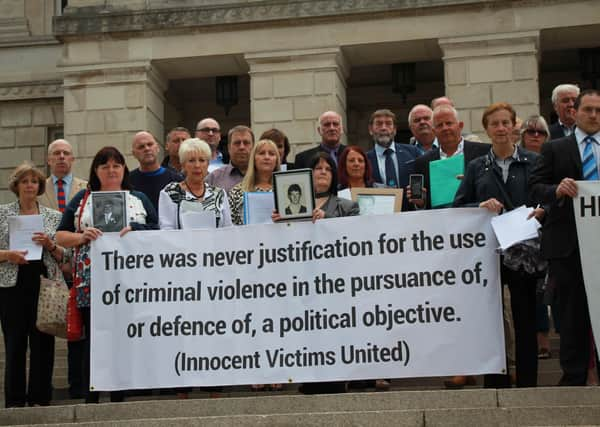Terror victims launch ‘equitable’ proposals on Troubles legacy


The fresh proposals are a response to government’s apparent determination to press ahead with a Troubles legacy strategy which many victims – and retired police officers – believe is unjust and unworkable.
One of the most contentious proposals blocking progress on wider legacy issues is the creation of a Historical Investigations Unit (HIU), operating effectively as a parallel police force with full police powers.
Advertisement
Hide AdAdvertisement
Hide AdAlthough provision for the creation of the HIU is contained in the 2014 Stormont House Agreement (SHA), the DUP has now rowed back from that position and said that agreement must be “revisited” to find a new solution “that recognises fairness and recognises what actually happened here in Northern Ireland over 35-40 years”.
Innocent Victims United (IVU) has today launched what they claim is a “sustainable solution” to fatal flaws in the 2018 Draft Bill produced by the government. It follows an acceptance last week by NI Secretary Brandon Lewis that “significant changes will be needed to obtain a broad consensus for the implementation of any legislation”.
The IVU draft document states that – in keeping with the “constitutional principles” of the United Kingdom – any HIU-type body carrying out investigations must not then adjudicate on its own findings.
It also proposes that all historic investigations are carried out by an enhanced Legacy Investigations Branch (LIB) of the PSNI – overseen by both the NI Policing Board and a new, independent judge-led oversight panel.
Advertisement
Hide AdAdvertisement
Hide AdThe suggested criteria for sparking a reinvestigation into a Troubles-era fatal incident is stated as: “Is there credible new evidence relating to a death that is capable of leading to the identification and prosecution of a person for a criminal offence related to the death?”
IVU spokesman Kenny Donaldson said: “On March 18 the UK government, through the NIO, announced its proposed roadmap for the way ahead. That proposal paves the way to amnesty, the scrubbing away of crimes committed in the context of ‘The Troubles.’ The proposals are unacceptable on so many levels. We offer a sustainable solution.”
Mr Donaldson said the proposals around an alternative to the HIU are “fair, balanced and realistic,” as well as being more affordable.
“All innocents, irrespective of who caused their victimhood, are entitled to a robust, proactive investigation concerning the events which forever changed their lives,” he said.
Advertisement
Hide AdAdvertisement
Hide Ad“That work can and should be advanced by specific legacy branches both within the PSNI and An Garda Siochanna which are appropriately resourced.”
In response to the UK government’s update on a way forward last week, Irish Foreign Minister Simon Coveney said: “Any approach has to be coherent across both jurisdictions. Only through a collective approach can we hope to deal with these issues comprehensively and fairly, and in a way that responds to the needs of victims and survivors, and society as a whole.”
Mr Donaldson said the IVU proposals offer a solution in keeping with Mr Coveney’s stated priorities, and added: “We await with interest the Irish government’s outline as to how it proposes to address these matters alongside the UK. We ask for considered engagement of our alternative proposals. All must be treated fairly and equitably.”
At Westminster last November, NI Police Federation chairman Mark Lindsay told MPs the government’s Legacy Bill was “perverse” because it “sought to equate the actions of murderers and bombers with the actions of those who worked tirelessly and courageously to bring them to justice”.
Advertisement
Hide AdAdvertisement
Hide AdSinn Fein remains vehemently opposed to any deviation from the SHA.
Last month, the party’s deputy leader Michelle O’Neill said: “The British and Irish governments and the political parties, including the DUP, signed up to the Stormont House Agreement to ensure that victims ... could get full disclosure about the killings of their loved ones. That agreement must be implemented in full”.